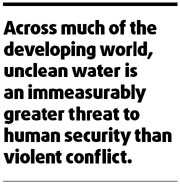Tomorrow is World Water Day. The theme of this year is "sanitation matters", which coincides with the International Year of Sanitation, calling for a global action plan to resolve a growing crisis that is affecting more than one out of three people on the planet.
It also challenges us to accelerate the progress toward the attainment of the Millennium Development Goal (MDG), envisioning halving the proportion of people living without access to basic sanitation by the year 2015 - but we are nowhere near on pace to achieve that goal.
Experts predict that by 2015, 2.1 billion people will still lack basic sanitation. At the present rate, sub-Saharan Africa will not reach the target until 2076.

Every 20 seconds, a child dies as a result of the abysmal sanitation conditions endured by about 2.6 billion people globally. That adds up to an unconscionable 1.5 million young lives cut short by a cause we know well how to prevent.
United Nations Development Program's Human Development Report 2006 has long claimed this issue as a global emergency: across much of the developing world, unclean water is an immeasurably greater threat to human security than violent conflict.
Yet, as the report points out, unlike wars and natural disasters, this global crisis does not galvanize concerted international action. Like hunger, it is a silent emergency experienced by the poor.
In China, it is estimated that more than 300 million rural residents still have low access to safe drinking water, facing problems of shortage as well as severe contamination. Pollution of water sources is an increasingly severe issue that is widespread.
The situation is not much better in schools in some rural regions, where water and sanitation facilities remain poor. Hygiene actually has certain multiplier effects that may not be evident at first glance.
In addition to roughly 660 major cities, China has about 18,000 towns. Many of them have limited financial resources for sanitation projects and limited urban planning capacity. Most place little emphasis on sanitation and have few sewerage systems and/or treatment facilities.
The remote provincial towns and the burgeoning mega cities all need major investments in water utilities. This will be costly, and in many cases impossible without financial help. But the ultimate price of a failure to invest in clean water supplies - in health care costs, lost productivity, and ultimately, human lives - far outweighs the expense of spending what is necessary now.
For several decades, the United Nations has been supporting government efforts to improve water resource management and access to safe drinking water for rural areas and acknowledges the importance of improving conditions for rural school children by providing them with access to a clean water supply, sanitary toilets, health education and technical training.
This week, together with our partners including the Ministry of Water Resources (MWR), China International Center for Economic and Technical Exchange (CICETE) and Coca-Cola, UNDP launched a four-year initiative aimed to improve water resources management and drinking water safety in rural China. This builds on the integrated UN programs across China to improve sanitation and access to clean and safe water for impoverished communities.
World Water Day offers a chance to spotlight these issues. If we take up the challenge, the positive impact will reverberate far beyond better access to clean water. Every dollar invested in water and sanitation yields an estimated seven dollars worth of productive activity. And that comes on top of the immeasurable gains in cutting poverty, improving health and raising living standards.
We have a collective responsibility to succeed. It is difficult to imagine a better investment in health and wellbeing of Chinese people, especially children.
The author is the United Nations Development Program resident representative in China.
(China Daily March 21, 2008)